2013江苏高考英语完型与阅读真题解析
2013年高考英语江苏卷详解
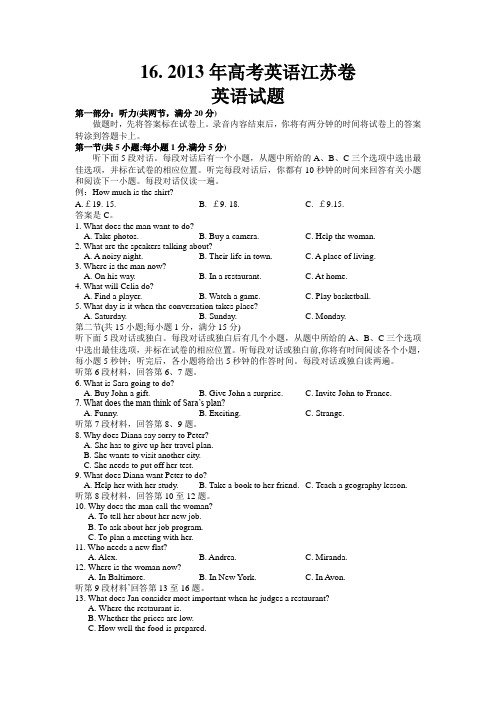
16. 2013年高考英语江苏卷英语试题第一部分:听力(共两节,满分20分)做题时,先将答案标在试卷上。
录音内容结束后,你将有两分钟的时间将试卷上的答案转涂到答题卡上。
第一节(共5小题;每小题1分,满分5分)听下面5段对话。
每段对话后有一个小题,从题中所给的A、B、C三个选项中选出最佳选项,并标在试卷的相应位置。
听完每段对话后,你都有10秒钟的时间来回答有关小题和阅读下一小题。
每段对话仅读一遍。
例:How much is the shirt?A.£19. 15.B. £9. 18.C. £9.15.答案是C。
1. What does the man want to do?A. Take photos.B. Buy a camera.C. Help the woman.2. What are the speakers talking about?A. A noisy night.B. Their life in town.C. A place of living.3. Where is the man now?A. On his way.B. In a restaurant.C. At home.4. What will Celia do?A. Find a player.B. Watch a game.C. Play basketball.5. What day is it when the conversation takes place?A. Saturday.B. Sunday.C. Monday.第二节(共15小题;每小题1分,满分15分)听下面5段对话或独白。
每段对话或独白后有几个小题,从题中所给的A、B、C三个选项中选出最佳选项,并标在试卷的相应位置。
听每段对话或独白前,你将有时间阅读各个小题,每小题5秒钟;听完后,各小题将给出5秒钟的作答时间。
每段对话或独白读两遍。
听第6段材料,回答第6、7题。
2013年全国高考英语完形填空原题解析

2013年高考英语试卷---江苏卷第二节:完形填空(共20小题;每小题1分,满分20分)请认真阅读下面短文,从短文后各题所给的A、B、C、D四个选项中,选出最佳选项,并在答题卡上将该项涂黑。
I used to believe in the American Dream, which meant a job, a mortgage (按揭), credit cards, success. I wanted it and worked toward it like everyone else, all of us 36 chasing the same thing.One year, through a series of unhappy events, it all fell 37 . I found myself homeless and alone. I had my truck and $ 56. I 38 the countryside for some place I could rent for the 39 possible amount. I came upon a shabby house four miles up a winding mountain road 40 the Potomac River in West Virginia. It was 41 , full of broken glass and rubbish. I found the owner, rented it, and 42 a corner to camp in.The locals knew nothing about me, 43 slowly, they started teaching me the 44 of being a neighbor. They dropped off blankets, candles, and tools, and began 45 around to chat. They started to teach me a belief in a 46 American Dream—not the one of individual achievement but of 47 .What I had believed in, all those things I thought were 48 for a civilized life, were nonexistent in this place. 49 on the mountain, my most valuable possessions were my 50 with my neighbors.Four years later, I moved back into 51 . I saw many people were having a really hard time, 52 their jobs and homes. I managed to rent a big enough house to 53 a handful of people. There are four of us now in the house, but over time I’ve had nine people come in and move on to other places. We’d all be in 54 if we hadn’t banded together.The American Dream I believe in now is a shared one. It’s not so much about what I can get for myself; it’s about 55 we can all get by together.36. A. separately B. equally C. violently D. naturally37. A. off B. apart C. over D. out38. A. crossed B. left C. toured D. searched39. A. fullest B. largest C. fairest D. cheapest40. A. at B. through C. over D. round41. A. occupied B. abandoned C. emptied D. robbed42. A. turned B. approached C. cleared D. cut43. A. but B. although C. otherwise D. for44. A. benefit B. lesson C. nature D. art45. A. sticking B. looking C. swinging D. turning46. A. wild B. real C. different D. remote47. A. neighborliness B. happiness C. friendliness D. kindness48. A. unique B. expensive C. rare D. necessary49. A. Up B. Down C. Deep D. Along50. A. cooperation B. relationships C. satisfaction D. appointments51. A. reality B. society C. town D. life52. A. creating B. losing C. quitting D. offering53. A. put in B. turn in C. take in D. get in54. A. yards B. shelters C. camps D. cottages55. A. when B. what C. whether D. how2013年普通高等学校招生全国统一考试(安徽卷)阅读下面短文,从短文后各题所给的四个选项(A、B、C和D)中,选出可以填入空白处的最佳选项,并在答题卡上将该项涂黑。
2013年英语江苏高考卷(答案)

2013年普通高等学校招生全国统一考试(江苏卷)第二部分英语知识运用第一节单项填空21.A句意:一般来说,学生们的内在动机及来自他人的高期望对他们的发展是必要的。
本题考查主谓一致。
由with连接的两个成分作主语,即A with B,谓语动词的单复数应该和A保持一致,所以本句谓语动词应该和students inner motivation 保持一致,用单数。
本句说的是一般情况,所以用一般现在时态。
故选A项。
22.B句意:——我收到的T恤和网上展示的不一样。
——怎么会?不过我答应你我们会马上调查这件事。
本题考查情景交际。
A:谁说的(表示不同意)?B:怎么会?C:为什么?D:为什么担心?23.B句意:——这城镇多么漂亮啊!正是我所喜欢的。
——我也是。
这个城镇的特色被保存得完好无缺。
本题考查动词辨析。
qualify使具有资格;preserve保存,保护,维护;decorate装饰;simplify简化,精简。
24.D句意:Lionel Messi创下了年度进球最多的纪录,被认为是欧洲最有天赋的足球运动员。
本题考查非谓语动词。
根据句子结构首先判断要用非谓语动词,set和主语Lionel Messi之间是主动关系,而且该动作先于is considered发生,所以用having done形式,故选D项。
25.A句意:——明天上午我可以用一下你的车吗?——当然可以。
我(明天上午)在家写报告。
本题考查时态。
根据句意可知是将要发生的事情,排除C和D项;根据句意写报告是明天上午这段时间将要做的事,所以用将来进行时,故选A项。
26.D句意:我总是很高兴收到你的邮件,关于七月一日的聚会,我将乐意参加。
本题考查介词短语辨析。
A:因为,由于;B:对……作出回应;C:由于,考虑到;D:关于。
27.D句意:那个男孩说:“我一秒钟都没有怀疑过我父亲会来救我。
”本题考查时态和倒装。
否定意义的词(主语除外)位于句首时句子要用部分倒装,排除A和C项。
2013年普通高等学校招生全国统一考试英语试题(江苏卷,解析版)
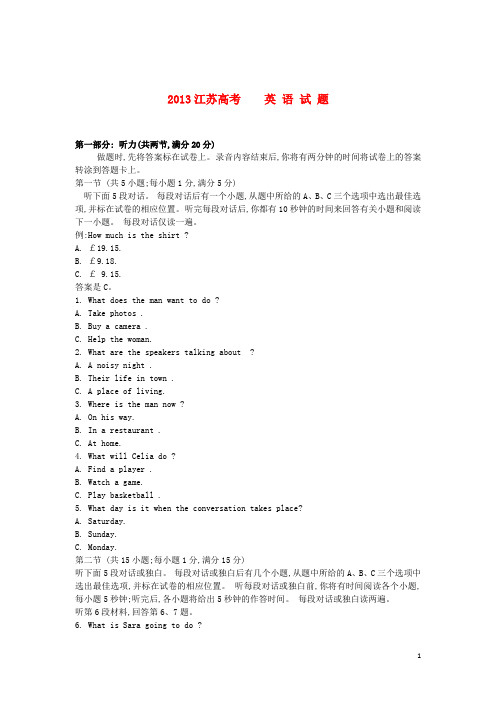
2013江苏高考英语试题第一部分: 听力(共两节,满分20分)做题时,先将答案标在试卷上。
录音内容结束后,你将有两分钟的时间将试卷上的答案转涂到答题卡上。
第一节 (共5小题;每小题1分,满分5分)听下面5段对话。
每段对话后有一个小题,从题中所给的A、B、C三个选项中选出最佳选项,并标在试卷的相应位置。
听完每段对话后,你都有10秒钟的时间来回答有关小题和阅读下一小题。
每段对话仅读一遍。
例:How much is the shirt ?A. £19.15.B. £9.18.C. £ 9.15.答案是C。
1. What does the man want to do ?A. Take photos .B. Buy a camera .C. Help the woman.2. What are the speakers talking about ?A. A noisy night .B. Their life in town .C. A place of living.3. Where is the man now ?A. On his way.B. In a restaurant .C. At home.4. What will Celia do ?A. Find a player .B. Watch a game.C. Play basketball .5. What day is it when the conversation takes place?A. Saturday.B. Sunday.C. Monday.第二节 (共15小题;每小题1分,满分15分)听下面5段对话或独白。
每段对话或独白后有几个小题,从题中所给的A、B、C三个选项中选出最佳选项,并标在试卷的相应位置。
听每段对话或独白前,你将有时间阅读各个小题,每小题5秒钟;听完后,各小题将给出5秒钟的作答时间。
每段对话或独白读两遍。
听第6段材料,回答第6、7题。
2013年江苏省高考英语试卷解析版

2013年江苏省高考英语试卷解析版参考答案与试题解析第一部分:听力(共两节,满分30分)做题时,先将答案标在试卷上。
录音内容结束后,你将有两分钟的时间将试卷上的答案转涂到答题卡上。
1.(1.5分)What does the man want to do?A.Take photosB.Buy a cameraC.Help the woman.【考点】15:短对话理解.【分析】略【解答】略【点评】略2.(1.5分)What are the speakers talking about?A.A noisy night.B.Their life in town.C.A place of living.【考点】15:短对话理解.【分析】略【解答】略【点评】略3.(1.5分)Where is the man now?A.on his way B.In a restaurant C.At home.【考点】15:短对话理解.【分析】略【解答】略【点评】略4.(1.5分)What will Celia do?A.Find a player.B.Watch a game.C.Play basketball.【考点】15:短对话理解.【分析】略【解答】略【点评】略5.(1.5分)What day is it when the conversation takes place?A.Saturday.B.Sunday.C.Monday.【考点】15:短对话理解.【分析】略【解答】B【点评】略6.(3分)听第6段材料,回答第6、7题.6.What is Sara going to do?A.Buy John a gift.B.Give John a surprise.C.Invite John to France.7.What does the man think of Sara's plan?A.Funny.B.Exciting.C.Strange.【考点】16:长对话理解.【分析】略【解答】BB【点评】略7.(3分)听第7段材料,回答第8、9题.8.Why does Diana say sorry to Peter?A.She has to give up her travel plan.B.She wants to visit another city.C.She needs to put off her test.9.What does Diana want Peter to do?A.Help her with her study.B.Take a book to her friend.C.Teach a geography lesson.【考点】15:短对话理解.【分析】略【解答】略【点评】略8.(4.5分)听第8段材料,回答第10至12题.10.Why does the man call the woman?A.To tell her about her new job.B.To ask about her job program.C.To plan a meeting with her.11.Who needs a new flat?A.Alex.B.Andrea.C.Miranda.12.Where is the woman now?A.In Baltimore.B.In New York.C.In Avon.【考点】16:长对话理解.【分析】略【解答】BBB【点评】略9.(6分)(1)What does Jan consider most important when he judges a restaurant?A.Where the restaurant is.B.Whether the prices are low.C.How well the food is prepared.(2)When did Jan begin to write for a magazine?A.After he came back to Sweden.B.Before he went to the United States.C.As soon as he got his first job in 1982.(3)What may Jan do to find a good restaurant?A.Talk to people in the street.B.Speak to taxi drivers.C.Ask hotel clerks.(4)What do we know about Jan?A.He cooks for a restaurant.B.He travels a lot for his work.C.He prefers American food.【考点】17:短文理解.【分析】略【解答】略【点评】略10.(6分)听第10段材料,回答第17至20题.17.What do we know about the Plaza Leon?A.It's a new building.B.It's a small town.C.It's a public place.18.When do Parents and children like going to the Plaza Leon?A.Saturday nights.B.Sunday afternoons.C.Fridays and Saturdays.19.Why does the speaker like Horatio Street best?A.Via del Mar Street.B.Fernmando Street.C.Hermandes Street.20.Why does the Speaker like Horatio Street best?A.It has an old stone surface.B.It is named after a writer.C.It has famous university.【考点】17:短文理解.【分析】略【解答】略【点评】略第二部分:英语知识运用(共两节,满分15分)第一节:单项填空(共15小题;每小题1分,满分15分)请认真阅读下面各题,从题中所给的A、B、C、D四个选项中,选出最佳选项,并在答题卡上将该项涂黑.11.(1分)Generally,students'inner motivation with high expectations from others ______ essential to their development.()A.is B.are C.was D.were【考点】AE:动词的辨析.【分析】一般说来,别人对其期望值高的学生,他们的内在动机对自身的发展是至关重要的【解答】答案:A 题干中主语是motivation,谓语动词要用单数;句意表达的是客观事实,要用一般现在时态.故选A.【点评】动词短语是一个比较难的语言点,搭配较多,用法灵活.学习时,要注意积累.尤其是相似或相近的用法,要注意区分和掌握.12.(1分)﹣The T﹣shirt I received is not the same as is shown online.﹣________?But I promise you we'll look into it right away.()A.Who says B.How come C.What for D.Why worry【考点】JI:语言交际.【分析】﹣﹣﹣我收到的体血衫与网上所展示的(图片)不同.﹣﹣﹣怎么会这样呢?但是我承诺/答应你我们将立即调查这件事.【解答】答案B.A项"谁说的";C项"为何?";D项"为何忧伤";B项"怎么会这样呢";根据答句中"But I promise you we'll look into it right away"提示可知,说话者对对方所说的事(收到的体血衫与网上所展示的图片不同)也感到难以置信,表示要调查此事.因此B项符合语境,故选B.【点评】本题考查情景交际.解答此类题目首先应该读懂句意,分析上下文语境和逻辑关系.其次对每个选项中的交际用语的适用情况要掌握,根据语境锁定正确答案.关键平时学习中要对交际用语多积累多总结反复记忆.13.(1分)﹣The town is so beautiful!I just love it.﹣Me too.The character of the town is well .()A.qualified B.preserved C.decorated D.simplified【考点】AE:动词的辨析.【分析】﹣小镇多漂亮啊!我喜欢.﹣我也是.小镇的特点要保留好.【解答】答案:B qualify合格;preserve保存,保留;decorate装点,装饰;simplify简化.句意表达的是保存好选择的特点,故选B.【点评】动词短语是一个比较难的语言点,搭配较多,用法灵活.学习时,要注意积累.尤其是相似或相近的用法,要注意区分和掌握.14.(1分)Lionel Messi,________ the record for the most goals in a calendar year,is considered the most talented football player in Europe.()A.set B.setting C.to set D.having set【考点】B2:现在分词的完成式.【分析】尼奥内尔.梅西,创造了年度进球最多的记录,被认为是欧洲最有天赋的足球员.【解答】答案:D题干中set the record for the most goals in a calendar year是作Messi的后置定语,两者构成主动关系,要用现在分词;句意表达的set动作发生在consider之前,要用分词的完成式.故选D.【点评】现在分词是非谓语动词的一种,表达主动或进行;过去分词表达被动或完成;动词不定式表达未发生的动作.学习时,要注意区分和掌握.15.(1分)﹣Could I use your car tomorrow morning?﹣Sure.I _______ a report at home.()A.will be writing B.will have writtenC.have written D.have been writing【考点】E7:将来进行时.【分析】﹣﹣明天上午我可以用一下你的车吗?﹣﹣可以.明天上午我会在写报告.【解答】答案:A.结合句意"明天上午我会在写报告"可知,答语强调的是明天上午自己在干的事情,所以用将来进行时.故选A.【点评】将来进行时的标志就是表达将来的某个时间正在发生或者进行的动作,结合句意或者时间状语即可做出正确选择.16.(1分)I am always delighted when I receive an email from you..The party on July 1stI shall be pleased to attend.()A.On account of B.In response toC.In view of D.With regard to【考点】8B:介词短语.【分析】每当我收到你的邮件我都很开心.关于七月一号的聚会,我很乐意参加.【解答】答案:D 本题考查短语辨析.on account of由于;in response to对…作出回应;in view of鉴于;with regard to关于.句意表达的是:电子邮件中提到的关于聚会的事.故选:D.【点评】介词短语搭配较多,用法灵活.学习时,要注意积累.对那些相似短语要注意区分和掌握.17.(1分)"Never for a second,"the boy says,"________ that my father would come to my rescue".()A.I doubted B.do I doubtC.I have doubted D.did I doubt【考点】GB:倒装句.【分析】这个男孩说:男孩说他一刻也没怀疑过他父亲会来救他.【解答】答案为D当否定副词或具有否定含义的短语置于句首时,句子常用部分倒装.故本题要用部分倒装.再根据would come to…可知,是在讲过去发生的事,故用过去时.故选D.【点评】部分倒装,部分倒装是指将谓语的一部分如助动词或情态动词倒装至主语之前.如果句中没有谓语,就用助动词或情态动词.否定意义的词放句首用部分倒装英语中构成部分倒装的主要情形有:1.含否定意义的词(如never,hardly,seldom,little,few,not until,not,not only,no sooner,no longer,nowhere,by no means 等)置于句首时,其后用部分倒装.如:Never have I seen read such a book.我从未读过那样的书.2.only 加状语(副词/介词短语/从句)放在句首时,其后用部分倒装.如:Only in this way can you do it well.只有这样你才能做好.3.so/neither/nor 表示前面所说的情况也适合于后者时,用"so/neither/nor+助动词+主语"这样的倒装句式.如:He can sing English songs and so can I.他会唱英语歌,我也会.4.当虚拟条件句含有were,should,had 时,可省略if,将were,should,had 置于句首.如:Were I Tom(=If I were Tom),I would refuse.如果我是汤姆,我就会拒绝.5.so…that 结构中,将so+adj./adv.置于句首时,其后要用倒装语序.如:So cold was the weather that we had to stay at home.天气太冷,我们只好呆在家里.18.(1分)In the global economy,a new drug for cancer,it is discovered,will create many economic possibilities around the world.()A.whatever B.whoever C.wherever D.whichever【考点】92:从属连词.【分析】在全球经济环境下,一种治癌新药,无论在什么地方被发现,都会给世界上创造出很多经济发展的可能性.【解答】答案:C题干中it is discovered是一个完整的句子,要用连接副词,whatever,whoever,whichever 都是连接代词,要充当从句的主语或宾语.故选:C.【点评】连词用来连接从句.按照类型可分为:从属连词,连接代词,连接副词.学习时,要注意区分和掌握.19.(1分)Team leaders must ensure that all members their natural desire to avoid the embarrassment associated with making mistakes.()A.get over B.look over C.take over D.come over【考点】A9:动词短语.【分析】团队领导者必须确保所有成员克服他们发自内心的渴望﹣﹣以避免犯错所带来的尴尬.【解答】答案:A.get over克服;恢复;熬过;look over查看;仔细检查;take over接收,接管;come over 过来,来访.根据句意"团队领导者必须确保所有成员克服他们发自内心的渴望﹣﹣想要避免犯错所带来的尴尬."可知,A项为正确答案.【点评】本题考查的是动词短语,要熟悉选项中短语的意思,并结合具体的语境选择出正确选项.20.(1分)I should not have laughed if I you were serious.()A.thought B.would thinkC.had thought D.have thought【考点】GJ:虚拟语气.【分析】如果我认为你是认真的,我就不会笑了.【解答】答案:C根据句意可知,本句是虚拟条件句.由于主句使用了should+have+done的形式,因此这里应表示与过去事实相反的假设,故if从句应使用过去完成时(had+done);故选:C.【点评】本题考查了虚拟条件句的用法.做本题时,需要掌握:当虚拟条件句表示与过去事实相反的假设时,主句使用should(not)+have+done的形式,从句应使用过去完成时.21.(1分)Shortly after suffering from a massive earthquake and to ruins,the city took ona new look.()A.reducing B.reducedC.being reduced D.having reduced【考点】B1:现在分词的被动式.【分析】在遭受大地震沦为废墟后不久,这座城市就呈现出新的面貌.【解答】答案:C短语搭配,be reduced to ruins表示"被…沦为废墟";句中be reduced to ruins是和suffering from并列,同时作介词after的宾语,要用动词的ing形式.故选:C.【点评】现在分词是非谓语动词的一种,表达主动或进行;过去分词表达被动或完成;动词不定式表达未发生的动作.学习时,要注意区分和掌握.22.(1分)The president of the World Bank says he has a passion for China,______ he remembers starting as early as his childhood.()A.where B.when C.what D.which【考点】59:关系代词;H2:非限制性定语从句.【分析】世界银行的总裁说他对中国有感情,他还记得早在童年时他就开始了这种深厚的感情.【解答】答案D.逗号之前主句,逗号是非限制性定语从句,which引导非限制性定语从句,指代passion,并与starring as early as…一起构成动名词复合结构在定语从句中remember的宾语.从句可还原为:He remembers the passion starring as early….A和B两项在定语从句中作状语.C项不引导定语从句,故选D项.【点评】本题考查非限制性定语从句.解答此类题目首先要分析句子结构,非限制性定语从句中逗号是一个明显的标志,然后分析非限制性定语从句中的成分,如果缺成分用关系代词,如果不缺成分用关系副词.23.(1分)With inspiration from other food cultures,American food culture can take a for the better.()A.share B.chance C.turn D.lead【考点】35:名词的词义辨析.【分析】有了其它饮食文化的启发,美国的饮食文化开始朝着好的方向发展.【解答】答案:Ctake a turn for the better好转,柳暗花明;其反义结构是take a turn for the worse恶化,急转直下.故选C.【点评】名词的词义辨析是常考题型.平时学习时要注意积累,特别是近义短语和固定搭配,要注意区分和掌握.24.(1分)﹣What about your self﹣drive trip yesterday?﹣Tiring!The road is being widened,and we_________ a rough ride.()A.had B.have C.would have D.have had【考点】E2:一般过去时.【分析】﹣﹣你昨天的自驾游怎么样?﹣﹣太累了!路正在加宽,我们一路很颠簸.【解答】答案:A根据对话的语境可知,是在谈论昨天的自驾游,要用一般过去式.故选A项.【点评】考查一般过去式.要根据语境或时间状语判断,然后再记住这种时态的句式结构.25.(1分)﹣Thank you for the flowers.﹣I thought they might cheer you up.()A.That's right B.All rightC.I mall right D.It's all right【考点】JI:语言交际.【分析】﹣﹣谢谢你的花.﹣﹣别客气.我认为他们可能会让你心情好起来的.【解答】答案:D.That's right 那是对的.All right 好吧,I'm all right我很好.It's all right 不用谢,别客气.Thank you的答语是It's all right.故选D.【点评】对于交际用语要分析句子的具体语境,搞明白前后之间的逻辑关系.四、标题26.(20分)I used to believe in the American Dream,which meant a job,a mortgage (按揭),credit cards,success.I wanted it and worked toward it like everyone else,all of us (36)A chasing the same thing.One year,through a series of unhappy events,it all fell(37)B.I found myself homeless and alone.I had my truck and $56.I (38)D the countryside for some place I could rent for the (39)D possible amount.I came upon a shabby house four miles up a winding mountain road (40)C the Potomac River in West Virginia.It was (41)B,full of broken glass and rubbish.I found the owner,rented it,and (42)C a corner to camp in.The locals knew nothing about me,(43)A slowly,they started teaching me the (44)D of being a neighbor.They dropped off blankets,candles,and tools,and began (45)A around to chat.They started to teach me a belief in a (46)C American Dream﹣notthe one of individual achievement but of (47)A.What I had believed in,all those things I thought were (48)D for a civilized life,were nonexistent in this place.(49)A on the mountain,my most valuable possessions were my (50)B with my neighbors.Four years later,I moved back into (51)C.I saw many people were having a really hard time,(52)B their jobs and homes.I managed to rent a big enough house to (53)Ca handful of people.There are four of us now in the house,but over time I've had nine peoplecome in and move on to other places.We'd all be in (54)B if we hadn't banded together.The American Dream I believe in now is a shared one.It's not so much about what I can get formyself;it's about (55)D we can all get by together.36.A.separately B.equally C.violently D.naturally 37.A.off B.apart C.over D.out 38.A.crossed B.left C.toured D.searched 39.A.fullest B.largest C.fairest D.cheapest 40.A.at B.through C.over D.round 41.A.occupied B.abandoned C.emptied D.robbed 42.A.turned B.approached C.cleared D.cut 43.A.but B.although C.otherwise D.for 44.A.benefit B.lesson C.nature D.art 45.A.sticking B.looking C.swinging D.turning 46.A.wild B.real C.different D.remote 47.A.neighborliness B.happiness C.friendliness D.kindness 48.A.unique B.expensive C.rare D.necessary 49.A.Up B.Down C.Deep D.Along 50.A.cooperation B.relationships C.satisfaction D.appointments 51.A.reality B.society C.town D.life 52.A.creating B.losing C.quitting D.offering 53.A.put in B.turn in C.take in D.get in 54.A.yards B.shelters C.camps D.cottages 55.A.when B.what C.whether D.how.【考点】M6:人生感悟类阅读.【分析】本文是一篇记叙文,在困境中来到乡下,在邻里之间的帮助下,我的思想转变了:美国梦是一个共享的梦.【解答】36.A考查副词的词义辨析.所有的人都各自地追逐着同样的东西.separately 各自地,分别地,符合题意.而equally平等地,violently猛烈地,暴力地,naturally自然地,皆不合题意.37.B动词短语辨析.由不好的事及下文我独自一人无家可归,可知一切都失败了.fall apart崩溃,失败,符合题意.38.D动词词义辨析.我在乡下搜索寻找一个可以租的地方.search…for…搜索某一范围找某个东西,符合题意.39.D形容词词义辨析.由上文我只有56美元,可知是找一个最便宜的出租地,故选D项.40.C考查上下文理解与推测.在河流的上方用over.41.B考查上下文理解与推测,充满破玻璃和垃圾,可知是一个废弃的地方.abandoned 废弃的,遗弃的,符合题意.occupied忙碌的,被占的.42.C由上文房子充满破玻璃和垃圾,所以,要先清理出一个角落才能入住.clear清理,符合题意.43.A上句当地人不认识我,下句他们开始教给我,之间是转折关系,用but连接两个并列分句.44.D由下文"邻居们放下毯子,蜡烛,工具"等等,可知这是作邻居的艺术,故选D 项.45.A邻居们放下东西,停下来聊天.stick around停留,逗留,符合题意.46.C考查上下文理解与推测.由下文"不是个人的成就,而是…"与我原本以为的完全不同,故选C项.47.A考查上下文理解与推测.由上文可知,作者感动的是邻里之间的和睦关系,故选A项.neighborliness睦邻,亲近,和睦,符合题意.48.D原本我认为对于城市生活必需的东西,故选D项.49.A由上文信息他的房子是在four miles up a winding mountain road可知这里的人们是住在山上,故选A项.50.B由上文12空处,可以看出,我最珍贵的财产就是我与邻居们的关系.故选B项.51.C考查上下文理解与推测.由move back搬回,可知又回到镇上,故选C项.52.B由下文我租了房子给人住,可以知道很多人失去了工作和房子,选losing.53.C我租了足够大的房子收留一些人,take in收留,留宿,符合题意.put in输入,turn in上交,get in收割,皆不合题意.54.B如果我们不联合起来,我们全都要住在收容所里.shelter收留所,遮蔽处,符合题意.55.D about后面的从句不缺主语、宾语、表语,因此不选what;也没有是否(whether)的意思;也没涉及时间(when)问题,因此只能选how.【点评】完形填空是考查语言的应用能力.解题时在理解文章大意的情况下,要充分考虑语境和上下文暗示.对于故事类的文章,因为情节性较强,要特别留心.第三部分:阅读理解(共4小题;每小题4分,满分30分)请认真阅读下列短文,从短文后各题所给的A、B、C、D四个选项中,选出最佳选项,并在答题卡上将该项涂黑。
2013年普通高等学校招生全国统一考试 英语(江苏卷)解析版

【试卷总评】2013年江苏省高考英语试卷整体难易程度比去年难,词汇量比往年增加。
首先,听力时间25分钟,以前几年大约在17分钟左右,所以学生感觉考试时间比较紧,有很多学生反映第二卷时间不够用,没做完。
单项填空难易程度适中,主要考查基本语法知识、词汇运用,涉及到词汇、短语的运用、日常用语、主谓一致、非谓语动词、时态、倒装、状语从句、定语从句、虚拟语气。
完形填空难度适中,考查的是一篇夹叙夹议的文章,描述了作者思想的变化过程。
刚开始的时候作者认为美国梦意味着工作、按揭、信用卡和成功等内容,并且一直都为之努力,但后来因为自己遭遇了一系列的不幸而无家可归,感觉孤独,这时他在农村租了房子住了下来。
在此期间他与当地人发展了友谊,并认识到“美国梦”并不是指一个人的梦想,而是邻里之间的梦想,“美国梦”并不是指自己得到什么,而是指大家团结起来共同生活,意味着互相分享。
四年后作者回到自己的家,从此他开始帮助别人,和他们团结起来一起追求自己的梦想,文章条理清晰,比较容易读懂。
阅读理解有点难度,阅读文章体裁有广告、议论文、和说明文。
第一篇是广告,只有两题,一题考查文章主旨,一题考查细节;第二篇议论文,是作者对“the morals of allocating things” (分配事情的道德标准)的见解。
作者提到以下几点内容:1. 额外付款得到更快服务和排队等候是分配事情所采取的两种不同方式,他们适用于不同的场合;2.排队等候原则在运动场上和车站似乎是对的,但也不是说所有场合都适用,有时候标准是会变的;3. 对待各种场合的录音信息不要太认真,有时候公司会利用呼叫中心给某些人优先权;4. 额外付款得到更快服务和排队等候并不是分配事情所采取的固定方式,可是现在额外付款得到更快服务的方式有取代排队等候和其它的分配方式的趋势,这排队原则的逐渐消失令人担忧,文中有些句子学生理解起来有一定难度,但题目以考查文章中心为主,学生能找到答案;第三篇是说明文,也可以说是研究发现,是对鱼龙等海洋生物变弯曲的原因的研究。
2013年普通高等学校招生全国统一考试英语试题(江苏卷,含答案)
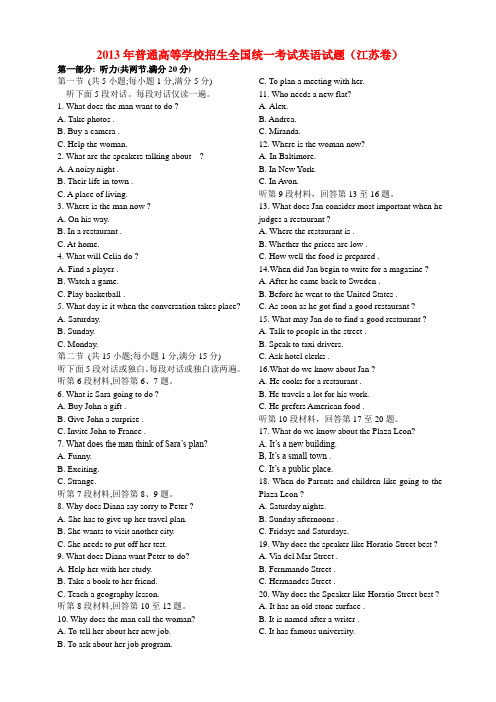
2013年普通高等学校招生全国统一考试英语试题(江苏卷)第一部分: 听力(共两节,满分20分)第一节(共5小题;每小题1分,满分5分)听下面5段对话。
每段对话仅读一遍。
1. What does the man want to do ?A. Take photos .B. Buy a camera .C. Help the woman.2. What are the speakers talking about ?A. A noisy night .B. Their life in town .C. A place of living.3. Where is the man now ?A. On his way.B. In a restaurant .C. At home.4. What will Celia do ?A. Find a player .B. Watch a game.C. Play basketball .5. What day is it when the conversation takes place?A. Saturday.B. Sunday.C. Monday.第二节(共15小题;每小题1分,满分15分)听下面5段对话或独白。
每段对话或独白读两遍。
听第6段材料,回答第6、7题。
6. What is Sara going to do ?A. Buy John a gift .B. Give John a surprise .C. Invite John to France .7. What does the man think of Sara’s plan?A. Funny.B. Exciting.C. Strange.听第7段材料,回答第8、9题。
8. Why does Diana say sorry to Peter ?A. She has to give up her travel plan.B. She wants to visit another city.C. She needs to put off her test.9. What does Diana want Peter to do?A. Help her with her study.B. Take a book to her friend.C. Teach a geography lesson.听第8段材料,回答第10至12题。
2013年江苏省英语高考试卷及答案

2013年全国高考英语试题(江苏卷)及答案第一部分:听力(共两节,满分30分)该部分分为第一、第二两节。
注意:回答听力部分时,请先将答案标在试卷上。
听力部分结束时,你将有两分钟的时间将你的答案转涂到客观题答题卡上。
第一节(共5小题;每小题1.5分,满分7.5分)听下面5段对话。
每段对话后有一个小题,从题中所给的A、B、C三个选项中选出最佳选项,并标在试卷的相应位置。
听完每段对话后,你都有10秒钟的时间来回答有关小题和阅读下一小题。
每段对话仅读一遍。
例:How much is the shirt?A. £19.15B. £9.18C. £9.15答案是C。
1. What does the man want to do?A. Take photos.B. Buy a camera.C. Help the woman.2. What are the speakers talking about?A. A noisy nightB. Their life in town.C. A place of living.3. Where is the man now?A. On his way.B. In a restaurant.C. At home.4. What will Celia do?A. Find a player.B. Watch a game.C. Play basketball.5. What day is it when the conversation takes place?A. Saturday.B. Sunday.C. Monday.第二节(共15小题;每小题1.5分,满分22.5分)听下面5段对话或独白。
每段对话或独白后有几个小题,从题中所给的A、B、C三个选项中选出最佳选项,并标在试卷的相应位置。
听每段对话或独白前,你将有时间阅读各个小题,每小题5秒钟;听完后,各小题将给出5秒钟的作答时间。
2013年高考英语江苏卷-答案
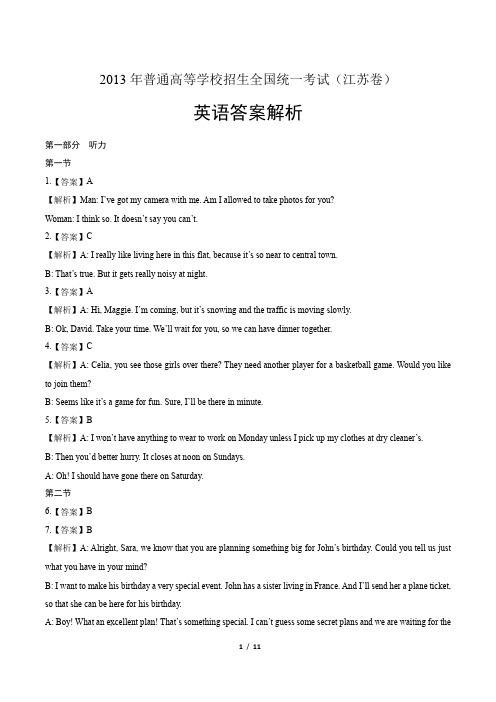
2013年普通高等学校招生全国统一考试(江苏卷)英语答案解析第一部分听力第一节1.【答案】A【解析】Man: I’ve got my camera with me. Am I allowed to take photos for you?Woman: I think so. It doesn’t say you can’t.2.【答案】C【解析】A: I really like living here in this flat, because it’s so near to central town.B: That’s true. But it gets really noisy at night.3.【答案】A【解析】A: Hi, Maggie. I’m coming, but it’s snowing and the traffic is moving slowly.B: Ok, David. Take your time. We’ll wait for you, so we can have dinner together.4.【答案】C【解析】A: Celia, you see those girls over there? They need another player for a basketball game. Would you like to join them?B: Seems like it’s a game for fun. Sure, I’ll be there in minute.5.【答案】B【解析】A: I won’t have anything to wear to work on Monday unless I pick up my clothes at dry cleaner’s.B: Then you’d better hurry. It closes at noon on Sundays.A: Oh! I should have gone there on Saturday.第二节6.【答案】B7.【答案】B【解析】A: Alright, Sara, we know that you are planning something big for John’s birthday. Could you tell us just what you have in your mind?B: I want to make his birthday a very special event. John has a sister living in France. And I’ll send her a plane ticket, so that she can be here for his birthday.A: Boy! What an excellent plan! That’s something special. I can’t guess some secret plans and we are waiting forthe right time to tell him.B: Well, I didn’t want to say anything until I was sure she could come.8.【答案】A9.【答案】B【解析】A: Hey, Peter, I’m sorry!B: Hi, Diana, what’s wrong?A: We were going to Hong Kong this weekend, but I’m afraid I can’t go.B: How come?A: I have a really big geography test and I have to study for it.B: We can go next week instead.A: No, I don’t want to ruin your weekend. You go ahead and please take the book I bought to my friend Sally. Tell her I have to study all weekend, because I can’t afford to fail the test.B: Ok, then I’ll go with them. But it’s a pity you can’t come.10.【答案】A11.【答案】B12.【答案】A【解析】A: Hello, this is Andrea.B: Hello, Andrea, this is Alex. I have some very big news for you. Miranda was very satisfied with you and said she was very much looking forward to working with you. Isn’t that wonderful? Congratulations dear! How does it feel to be Miranda’s new assistant? How I imagine that you’ll just be delighted with this news. So let’s see, you can start on Monday, right?A: Umm, well, I don’t think I can start on Monday. I am visiting my father in Baltimore. And because I don’t live in New York, I’ll need a couple of days to find a flat and buy some furniture and move my things from Avon.B: Oh, well then, in that case I suppose Wednesday will be good. Ok, see you then!13.【答案】C14.【答案】A15.【答案】A16.【答案】B【解析】Woman: Hello, Mr. Jan Erick Freedman. You’re a frequent traveler. And we also know that you eat out twice a day. How can you get so far and eating out.Man: When I my first job back in 1982 and started travelling. I had no other choice but eat out I found that I feltdifferent due to what I was eating, so I tried to find places that served food that made me feel good. The secret was the quality of the food and how well the food was prepared. I made an effort to find out good restaurants as well as nice dishes.Woman: How did you manage to make a list of 218 favorite restaurants?Man: I’ve lived in cities and when I moved back to Sweden from the United States, people asked me where to go and eat and went to the cities I know. I got a lot of ideas. Then I wrote about restaurants for a Swedish club magazine and some suggested I gather information about restaurants together since I had all the facts about the restaurants I’ve been to. I started to do that.Woman: How do you find restaurants?Man: The best way is to ask the people there. I may talk to the people at the street market or take a walk and look for place for myself. I never asked hotel clerks or taxi drivers. I don’t go either restaurants or places with menus too difficult to understand.17.【答案】C18.【答案】B19.【答案】C20.【答案】C【解析】Man: At the beginning of the tour, we all started the most important place at my town which is the Plaza Leon. The Plaza Leon is more than 100 years old. It’s a gathering place for young people on Friday and Saturday nights, and for parents and children on Sunday afternoon. Four streets lead to the Plaza which have white sidewalks and tree lined. Hemandes Street which was named after writers born in the city contains all of the food stalls fish markets and vegetable stands. Femando Street which was named after a famous educator is where all of the government offices, shops and houses. Via del Mar Street which is the only street which has old stone surfaces. Finally we came to the Hewish’s Street on which there are two universities, one of which is the most famous university in my country. That’s why it’s my favorite street of all.第二部分英语知识运用第一节单项填空21.【答案】A【解析】句意:一般来说,为达到其他人的高期望而产生的内部动力对学生的自身发展是非常重要的。
2013年江苏高考英语试卷及答案(word精准版)
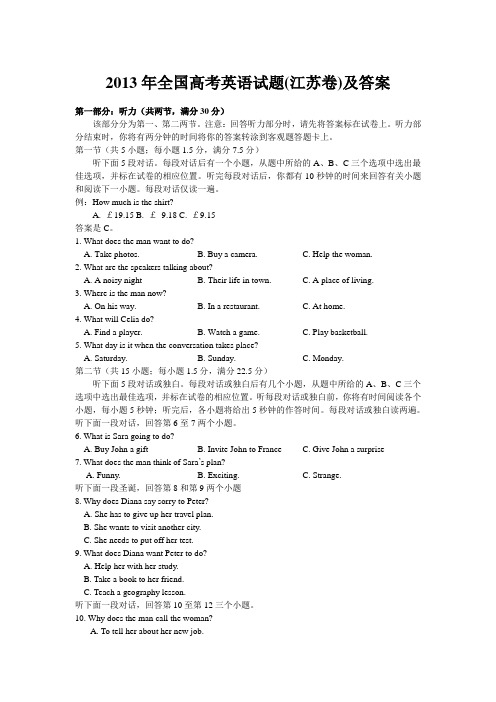
2013年全国高考英语试题(江苏卷)及答案第一部分:听力(共两节,满分30分)该部分分为第一、第二两节。
注意:回答听力部分时,请先将答案标在试卷上。
听力部分结束时,你将有两分钟的时间将你的答案转涂到客观题答题卡上。
第一节(共5小题;每小题1.5分,满分7.5分)听下面5段对话。
每段对话后有一个小题,从题中所给的A、B、C三个选项中选出最佳选项,并标在试卷的相应位置。
听完每段对话后,你都有10秒钟的时间来回答有关小题和阅读下一小题。
每段对话仅读一遍。
例:How much is the shirt?A. £19.15B. £9.18C. £9.15答案是C。
1. What does the man want to do?A. Take photos.B. Buy a camera.C. Help the woman.2. What are the speakers talking about?A. A noisy nightB. Their life in town.C. A place of living.3. Where is the man now?A. On his way.B. In a restaurant.C. At home.4. What will Celia do?A. Find a player.B. Watch a game.C. Play basketball.5. What day is it when the conversation takes place?A. Saturday.B. Sunday.C. Monday.第二节(共15小题;每小题1.5分,满分22.5分)听下面5段对话或独白。
每段对话或独白后有几个小题,从题中所给的A、B、C三个选项中选出最佳选项,并标在试卷的相应位置。
听每段对话或独白前,你将有时间阅读各个小题,每小题5秒钟;听完后,各小题将给出5秒钟的作答时间。
2013年高考英语真题试题与答案解析——江苏

2013年高考英语真题试题与答案解析——江苏2013·江苏卷第二部分英语知识运用(共两节,满分35分)第一节单项填空(共15小题;每小题1分,满分15分)请认真阅读下面各题,从题中所给的A、B、C、D四个选项中,选出最佳选项。
例:It is generally considered unwise to give a child ________ he or she wants.A.however B.whateverC.whichever D.whenever答案是B。
21.Generally,students' inner motivation with high expectations from others ________ essential to their development.A.is B.are C.was D.were21.A 考查主谓一致。
主语students' inner motivation表示单数意义,所以谓语动词用单数,并且叙述的是通常情况下的状态,所以用一般现在时,故选A项。
22.—The Tshirt I received is not the same as is shown online.—________ ?But I promise you we'll look into it right away.A.Who says B.How comeC.What for D.Why worry22.B 考查情景交际。
句意:——我收到的T恤衫跟网上展出的不一样。
——怎么会那样呢?我向你保证我们将立刻着手调查。
How come?意为“怎么会?”,符合语境。
A项意为“谁说的”;C 项意为“为何目的”;D项意为“为何担忧”,均与语境不符。
23.—The town is so beautiful! I just love it.—Me too.The character of the town is well ________.A.qualified B.preservedC.decorated D.simplified23.B 考查动词辨析。
2013年普通高等学校招生全国统一考试 英语(江苏卷)word版(含答案)
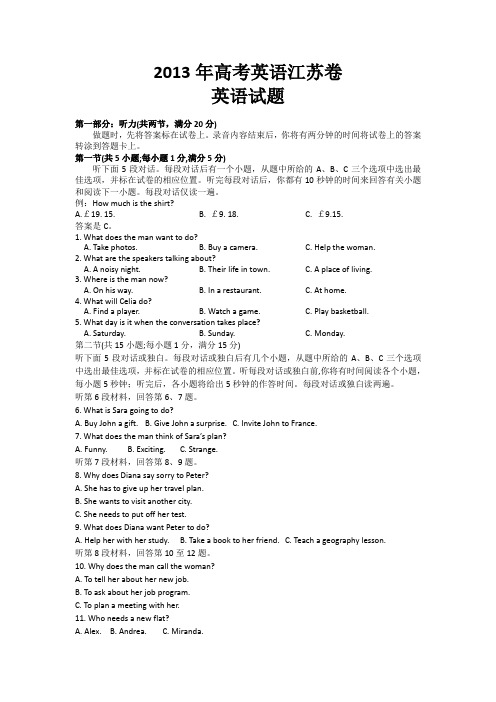
2013年高考英语江苏卷英语试题第一部分:听力(共两节,满分20分)做题时,先将答案标在试卷上。
录音内容结束后,你将有两分钟的时间将试卷上的答案转涂到答题卡上。
第一节(共5小题;每小题1分,满分5分)听下面5段对话。
每段对话后有一个小题,从题中所给的A、B、C三个选项中选出最佳选项,并标在试卷的相应位置。
听完每段对话后,你都有10秒钟的时间来回答有关小题和阅读下一小题。
每段对话仅读一遍。
例:How much is the shirt?A.£19. 15.B. £9. 18.C. £9.15.答案是C。
1. What does the man want to do?A. Take photos.B. Buy a camera.C. Help the woman.2. What are the speakers talking about?A. A noisy night.B. Their life in town.C. A place of living.3. Where is the man now?A. On his way.B. In a restaurant.C. At home.4. What will Celia do?A. Find a player.B. Watch a game.C. Play basketball.5. What day is it when the conversation takes place?A. Saturday.B. Sunday.C. Monday.第二节(共15小题;每小题1分,满分15分)听下面5段对话或独白。
每段对话或独白后有几个小题,从题中所给的A、B、C三个选项中选出最佳选项,并标在试卷的相应位置。
听每段对话或独白前,你将有时间阅读各个小题,每小题5秒钟;听完后,各小题将给出5秒钟的作答时间。
每段对话或独白读两遍。
听第6段材料,回答第6、7题。
2013年江苏省高考英语试卷及答案(word版)

2013年高考英语江苏卷英语试题第一部分:听力(共两节,满分20分)做题时,先将答案标在试卷上。
录音内容结束后,你将有两分钟的时间将试卷上的答案转涂到答题卡上。
第一节(共5小题;每小题1分,满分5分)听下面5段对话。
每段对话后有一个小题,从题中所给的A、B、C三个选项中选出最佳选项,并标在试卷的相应位置。
听完每段对话后,你都有10秒钟的时间来回答有关小题和阅读下一小题。
每段对话仅读一遍。
例:How much is the shirt?A.£19. 15.B. £9. 18.C. £9.15.答案是C。
1. What does the man want to do?A. Take photos.B. Buy a camera.C. Help the woman.2. What are the speakers talking about?A. A noisy night.B. Their life in town.C. A place of living.3. Where is the man now?A. On his way.B. In a restaurant.C. At home.4. What will Celia do?A. Find a player.B. Watch a game.C. Play basketball.5. What day is it when the conversation takes place?A. Saturday.B. Sunday.C. Monday.第二节(共15小题;每小题1分,满分15分)听下面5段对话或独白。
每段对话或独白后有几个小题,从题中所给的A、B、C三个选项中选出最佳选项,并标在试卷的相应位置。
听每段对话或独白前,你将有时间阅读各个小题,每小题5秒钟;听完后,各小题将给出5秒钟的作答时间。
每段对话或独白读两遍。
听第6段材料,回答第6、7题。
- 1、下载文档前请自行甄别文档内容的完整性,平台不提供额外的编辑、内容补充、找答案等附加服务。
- 2、"仅部分预览"的文档,不可在线预览部分如存在完整性等问题,可反馈申请退款(可完整预览的文档不适用该条件!)。
- 3、如文档侵犯您的权益,请联系客服反馈,我们会尽快为您处理(人工客服工作时间:9:00-18:30)。
第二节: 完形填空(共20 小题; 每小题1 分, 满分20 分)请认真阅读下面短文, 从短文后各题所给的A、B、C、D 四个选项中, 选出最佳选项, 并在答题卡上将该项涂黑。
I used to believe in the American Dream, which meant a job, a mortgage (按揭), credit cards, success. I wanted it and worked toward it like everyone else, all of us 36 chasing the same thing.One year, through a series of unhappy events, it all fell 37 . I found myself homeless and alone. I had my truck and $56. I 38 the countryside for some place I could rent for the 39 possible amount. I came upon a shabby house four miles up a winding mountain road 40 the Potomac River in West Virginia. It was 41 , full of broken glass and rubbish. I found the owner ,rented it, and 42 a corner to camp in.The locals knew nothing about me, 43 slowly, they started teaching me the 44 of being a neighbor. They dropped off blankets, candles, and tools, and began 45 around to chat. They started to teach me a belief in a 46 American Dream—not the one of individual achievement but of 47 .What I had believed in, all those things I thought were 48 for a civilized life, were nonexistent in this place. 49 on the mountain, my most valuable possessions were my 50 with my neighbors.Four years later, I moved back into 51 . I saw many people were having a really hard time, 52 their jobs and homes. I managed to rent a big enough house to 53 a handful of people .There are four of us now in the house, but over time I’ve had nine people come in and move on to other places. We’d all be in54 if we hadn’t banded together.The American Dream I believe in now is a shared one. It’s not so much about what I can get for myself; it’s about 55 we can all get by together.36. A. separately B. equally C. violently D. naturally37. A. off B. apart C. over D. out38. A. crossed B. left C. toured D. searched39. A. fullest B. largest C. fairest D. cheapest40. A. at B. through C. over D. round41.A. occupied B. abandoned C. emptied D. robbed42. A. turned B. approached C. cleared D. cut43. A. but B. although C. otherwise D. for44. A. benefit B. lesson C. nature D. art45. A. sticking B. looking C. swinging D. turning46. A. wild B. real C. different D. remote47. A. neighborliness B. happiness C. friendliness D. kindness48. A. unique B. expensive C. rare D. necessary49. A. Up B. Down C. Deep D. Along50. A. cooperation B. relationships C. satisfaction D. appointments51. A. reality B. society C. town D. life52.A. creating B. losing C. quitting D. offering53. A. put in B. turn in C. take in D. get in54. A. yards B. shelters C. camps D. cottages55. A. when B. what C. whether D. how第三部分:阅读理解(共15小题;每小题2分,满分30分)请认真阅读下列短文,从短文后各题所给的A、B、C、D四个选项中,选出最佳选项,并在答题卡上将该项涂黑。
56. The leaflet is to inform visitors of the Park’s ________.A. advanced managementB. thrill performancesC. entertainment facilitiesD. thoughtful services57. A visitor to the Park can ________.A. rent a stroller outside Front GateB. ask for first aid by Thunder RunC. smoke in the Water ParkD. leave his pet at KidZvilleBWe’ve considered several ways of paying to cut inline: hiring line standers, buying tickets from scalpers (票贩子), or purchasing line cutting privileges directly from, say, an airline or an amusement park. Each of these deals replaces the morals of the queue (waiting your turn) with the morals of the market (paying a price for faster service).Markets and queues—paying and waiting—are two different ways of allocating things, and each is appropriate to different activities. The morals of the queue, “First come, first served,”have an egalitarian(平等主义的) appeal. They tell us to ignore privilege, power, and deep pockets.The principle seems right on play grounds and at bus stops. But the morals of the queue do not govern all occasions. If I put my house up for sale, I have no duty to accept the first offer that comes along, simply because it’s the first. Selling my house and waiting for a bus are different activities, properly governed by different standards.Sometimes standards change, and it is unclear which principle should apply. Think of the recorded message you hear, played over and over, as you wait on hold when calling your bank:“Your call will be answered in the order in which it was received.”This is essential for the morals of the queue. It’s as if th ecompany is trying to ease our impatience with fairness.But don’t take the recorded message too seriously. Today, some people’s calls are answered faster than others. Call center technology enables companies to“score”incoming call sand to give faster service to those that come from rich places. You might call this telephonic queue jumping.Of course, markets and queues are not the only ways of allocating things. Some goods we distribute by merit, others by need, still others by chance. However, the tendency of markets to replace queues, and other non-market ways of allocating goods is so common in modern life that we scarcely notice it anymore. It is striking that most of the paid queue-jumping schemes we’ve considered—at airports and amusement parks, in call centers, doctors’offices, and national parks—are recent developments, scarcely imaginable three decades ago. The disappearance of the queues in these places may seem an unusual concern, but these are not the only places that markets have entered. 58. According to the author, which of the following seems governed by the principle“First come, first served”?A. Taking buses.B. Buying houses.C. Flying with an airline.D. Visiting amusement parks.59. The example of the recorded message in Paragraphs 4 and 5 illustrates .A. the necessity of patience in queuingB. the advantage of modern technologyC. the uncertainty of allocation principleD. the fairness of telephonic services60. The passage is meant to .A. justify paying for faster servicesB. discuss the morals of allocating thingsC. analyze the reason for standing in lineD. criticize the behavior of queue jumpingCIf a diver surfaces too quickly, he may suffer the bends.Nitrogen(氮) dissolved(溶解) in his blood is suddenly liberated by the reduction of pressure. The consequence, if the bubbles (气泡)accumulate in a joint, is sharp pain and abent body—thus the name.If the bubbles form in his lungs or his brain, the consequence can be death.Other air-breathing animals also suffer thisdecompression(减压) sickness if they surface too fast:whales, for example. And so, long ago, did ichthyosaurs.That these ancient sea animals got the bends can be seenfrom their bones. If bubbles of nitrogen form inside the bonethey can cut off its blood supply. This kills the cells in thebone, and consequently weakens it, sometimes to the pointof collapse. Fossil (化石)bones that have caved in on themselves are thus a sign that the animal once had the bends.Bruce Rothschild of the University of Kansas knewallthis when he began a study of ichthyosaur bones to find outhow widespread the problem was in the past. What heparticularly wanted to investigate was how ichthyosaursadapted to the problem of decompression over the 150 million years. To this end, he and his colleagues traveled the world’s natural-history museums, looking at hundreds of ichthyosaurs from the Triassic period and from the later Jurassic and Cretaceous periods.When he started, he assumed that signs of the bends would be rarer in younger fossils, reflecting their gradual evolution of measures to deal with decompression. Instead, he was astonished to discover the opposite. More than 15% of Jurassic and Cretaceous ichthyosaurs had suffered the bends before they died, but not a single Triassic specimen(标本) showed evidence of that sort of injury.If ichthyosaurs did evolve an anti-decompression means, they clearly did so quickly—and, most strangely, they lost it afterwards. But that is not what Dr Rothschild thinks happened. He suspects it was evolution in other animals that caused the change.Whales that suffer the bends often do so because they have surfaced to escape a predator (捕食动物) such as a large shark. One of the features of Jurassic oceans was an abundance of large sharks and crocodiles, both of which were fond of ichthyosaur lunches. Triassic oceans, by contrast, were mercifully shark- and crocodile-free. In the Triassic, then, ichthyosaurs were top of the food chain. In the Jurassic and Cretaceous, they were prey(猎物) as well as predator—and often had to make a speedy exit as a result.61. Which of the following is a typical symptom of the bends?A. A twisted body.B. A gradual decrease in blood supply.C. A sudden release of nitrogen in blood.D. A drop in blood pressure.62. The purpose o f Rothschild’s study is to see ________ .A. how often ichthyosaurs caught the bendsB. how ichthyosaurs adapted to decompressionC. why ichthyosaurs bent their bodiesD. when ichthyosaurs broke their bones63. Rothschild’s finding stated in Paragraph4 .A. confirmed his assumptionB. speeded up his research processC. disagreed with his assumptionD. changed his research objectives64. Rothschild might have concluded that ichthyosaurs .A. failed to evolve an anti decompression meansB. gradually developed measures against the bendsC. died out because of large sharks and crocodilesD. evolved an anti decompression means but soon lost itDMark Twain has been called the inventor of the American novel. And he surely deserves additional praise: the man who popularized the clever literary attack on racism.I say clever because anti-slavery fiction had been the important part of the literature in the years before the Civil War. H. B. Stowe’s Uncle Tom’s Cabin is only the most famous example. These early stories dealt directly with slavery. With minor exceptions, Twain planted his attacks on slavery and prejudice into tales that were on the surface about something else entirely. He drew his readers into the argument by drawing them into the story.Again and again, in the postwar years, Twain seemed forced to deal with the challenge of race. Consider the most controversial, at least today, of Twain’s novels, Adventures of Huckleberry Finn. Only a few books have been kicked off the shelves as often as Huckleberry Finn, Twain’s most widely read tale. Once upon a time, people hated the book because it struckthemas rude. Twain himself wrote that those who banned the book considered the novel “trash and suitable only for the slums(贫民窟).”More recently the book has been attacked because of the character Jim, the escaped slave, and many occurrences of the word nigger. (The term Nigger Jim, for which the novel is often severely criticized, never appears in it.)But the attacks were and are silly—and miss the point. The novel is strongly anti-slavery. Jim’s search through the slave states for the family from whom he has been forcibly parted is heroic. As J. Chadwick has pointed out, the character of Jim was a first in American fiction—a recognition that the slave had two personalities, “the voice of survival within a white slave culture and the voice of the individual: Jim, the father and the man.”There is much more. Twain’s mystery novel Pudd’nhead Wilson stood as a challenge to the racial beliefs of even many of the liberals of his day. Written at a time when the accepted wisdom held Negroes to be inferior (低等的) to whites, especially in intelligence, Twain’s tale centered in part around two babies switched at birth. A slave gave birth to her master’s baby and, for fear that the child should be sold South, switched him for the master’s baby by his wife. The slave’s light-skinned child was taken to be white and grew up with both the attitudes and the education of the slave-holding class. The master’s wife’s baby was taken for black and grew up with the attitudes and intonations of the slave.The point was difficult to miss: nurture (养育), not nature, was the key to social status. The features of the black man that provided the stuff of prejudice—manner of speech, for example—were, to Twain, indicative of nothing other than the conditioning that slavery forced on its victims.Twain’s racial tone was not perfect. One is left uneasy, for example, by the lengthy passage in his autobiography (自传) about how much he loved what were called “nigger shows”in his youth—mostly with white men performing in black-face—and his delight in getting his mother to laugh at them. Yet there is no reason to think Twain saw the shows as representing reality. His frequent attacks on slavery and prejudice suggest his keen awareness that they did not.Was Twain a racist? Asking the questioning the 21 stcentury is as wise as asking the same of Lincoln. If we read the words and attitudes of the past through the “wisdom”of the considered moral judgments of the present, we will find nothing but error. Lincoln, who believed the black man the inferiorof the white, fought and won a war to free him. And Twain, raised in a slave state, briefly a soldier, and inventor of Jim, may have done more to anger the nation over racial injustice and awaken its collective conscience than any other novelist in the past century.65. How do Twain’s novels on slavery differ from Stowes?A. Twain was more willing to deal with racism.B. Twain’s attack on racism was much less open.C. Twain’s themes seemed to agree with plots.D. Twain was openly concerned with racism.66. Recent criticism of Adventures of Huckleberry Finn arose partly from its_____.A. target readers at the bottomB. anti slavery attitudeC. rather impolite languageD. frequent use of “nigger”67. What best proves Twain’s anti slavery stand according to the author?A. J im’s search for his family was described in detail.B. The slave’s voice was first heard in American novels.C. Jim grew up into a man and a father in the white culture.D. Twain suspected that the slaves were less intelligent.68. The story of two babies switched mainly indicates that .A. slaves were forced to give up their babies to their mastersB. slaves babies could pickup slave holders‵way of speakingC. blacks‵social position was shaped by how they were brought upD. blacks were born with certain features of prejudice69. What does the under lined word“they” in Paragraph 7 refer to?A. The attacks.B. Slavery and prejudice.C. White men.D. The shows.70. What does the author mainly argue for?A. Twain had done more than his contemporary writers to attack racism.B. Twain was an admirable figure comparable to Abraham Lincoln.C. Twain’s works had been banned on unreasonable grounds.D. Twain’s works should be read from a historical point of view.完形填空的结构,“使某人做某事”。
